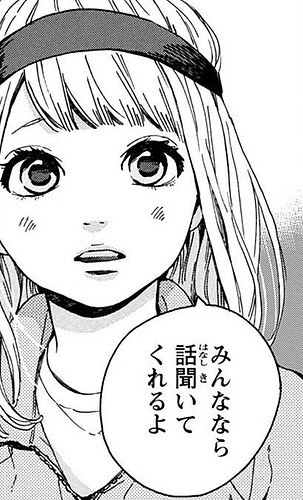Week 2!
Honestly, one thing I really appreciate about Ruri Dragon so far is how manageable the Japanese has been for a learner. I was reading Hunter x Hunter before this and the difference is quite large in terms of difficulty. At least for me. There’s been some grammar and vocab I just didn’t know this week, but that’s par for the course at this point. Anyway, here’s my translation.
Pages 18-19
ルリ:学校行くかぁ。
Ruri: I’ll go to school.
ルリ:やばやば。ユカもう来てるかな。
Ruri: Damn. I wonder if Yuka is already on her way.
ルリ:よっし間に合う。
Ruri: Right, I’ll be on time.
ルリ:…やっぱ目立つかなぁ
Ruri: …As expected, I guess I stand out.
Pages 20-21
ルリ:「まぁ生えてしまったもンはしょうがないしな」
Ruri: Ah, it can’t be helped if they’ve finished growing.
ルリ:おっとカギカギ。
Ruri: Oops. Keys, keys.
ルリ:「ドラゴン…何だドラゴンって。空想上の生物じゃないのか。」
Ruri: Dragon…What’s a dragon? Are they not fantasy creatures?
ルリ:「父親がドラゴン…?」
Ruri: Dad was a dragon…?
ルリ:「じゃあわたしは一体何なんだ。」
Ruri: Well then, what the heck am I?
ルリ:「そういやお母さん最初“龍”って言ってたな。」
Ruri: Come to think of it, Mum said “Dragon” first.
ルリ:「何か違うんだろうか。」
Ruri: Something’s different, right?
ルリ:「…確か日本の龍って。」
Ruri: If I’m not mistaken, that’s a japanese dragon.
ルリ:「鯉」…?
Ruri: A carp…?
ルリ:「考えんのやめよ。」
Ruri: Stop thinking about it.
ルリ:おーいユカ。
Ruri: Hey, Yuka!
ユカ:あ!!
Yuka: Ah!!
Pages 22-23
ユカ:おっ…ぇ何そのツノ。
Yuka: Um…What are those horns?
ルリ:ギリギリ…信号全部青でよかった。
Ruri: Only just…thank goodness all the traffic lights were green.
ユカ:どうしたのソレ。
Yuka: What’s wrong?
ルリ:いやなんか朝起きたらこんななってて。
Ruri: Well, when I woke up this morning it was like this.
ユカ:うそぉ大丈夫なの?
Yuka: No way, are you all right?
ユカ:乗ろ乗ろ
Yuka: Get on, get on!
ユカ:何ソレ本当に生えてんの?
Yuka: What, did that really grow?
ルリ:うん。なんかわたし人間じゃないらしいよ。
Ruri: Yeah. It seems like I’m not human.
ルリ:…ねぇ。ドラゴンって…本当にいろの?
Ruri: …Hey. Dragons…do they really exist?
ユカ:ぇ何…?いないでしょ。
Yuka: What…? They don’t, right?
ルリ:あーいや…うん。だよね。
Ruri: Ah, no…yeah. I know, right?
Pages 24-26
ユカ:えっ。もしかしてそのツノの話してる?
Yuka: Eh? Perhaps you are speaking about those horns?
ルリ:ウソ絶対嘘だと思うよねわたしも思う。
Ruri: I think that’s definitely not the case.
ユカ:何…ルリドラゴンなの?
Yuka: What…you’re a dragon?
ルリ:いやわたしというか父親がドラゴンらしくてさ。
Ruri: No, I mean, it seems my father is a dragon.
ユカ:ええ?何それ。
Yuka: Eh? What’s that?
ユカ:まあでもツノ生えてるもんね…
Yuka: Well, even so, they’re growing, right?
ルリ:そうなんだよねー
Ruri: Yeah, that’s right…
ユカ:へーマジで生えてる。
Yuka: Eh, they’re seriously growing!?
ルリ:何でそんな触んの。
Ruri: Why are you touching them like that?
ルリ:視線を感じる。
Ruri: I feel everyone looking at me.
ユカ:今更だね。もう休めばよかったのに。
Yuka: Now? Despite the fact that it would have been good if you took a day off already.
ルリ:思った。
Ruri: I thought about it.
ルリ:「目立ちませんように…」
Ruri: [I’m hoping I don’t stand out…]
生徒:おい青木ツノ生えてるわ。
Student: Hey, Aoki! You grew those horns!
ルリ:やめて見ないでください。
Ruri: Stop, please don’t look.
ルリ:「何で気付くの早いんだよ。」
Ruri: [Why did they notice so fast?]
生徒:お前何そのツノ。
Student: Hey you, what are those horns?
ルリ:生えたの。お前って言うな。
Ruri: They grew. Don’t say ‘You’.
生徒:何でツノ生えてんの?
Student: Why did those horns grow?
生徒:かっけー俺もツノ生やそ。
Student: Cool! I’ll also grow some horns!
生徒:どうやってだよ。
Student: How!?
ルリ:ちょっと男子邪魔。
Ruri: Hey! These boys are a bother.





